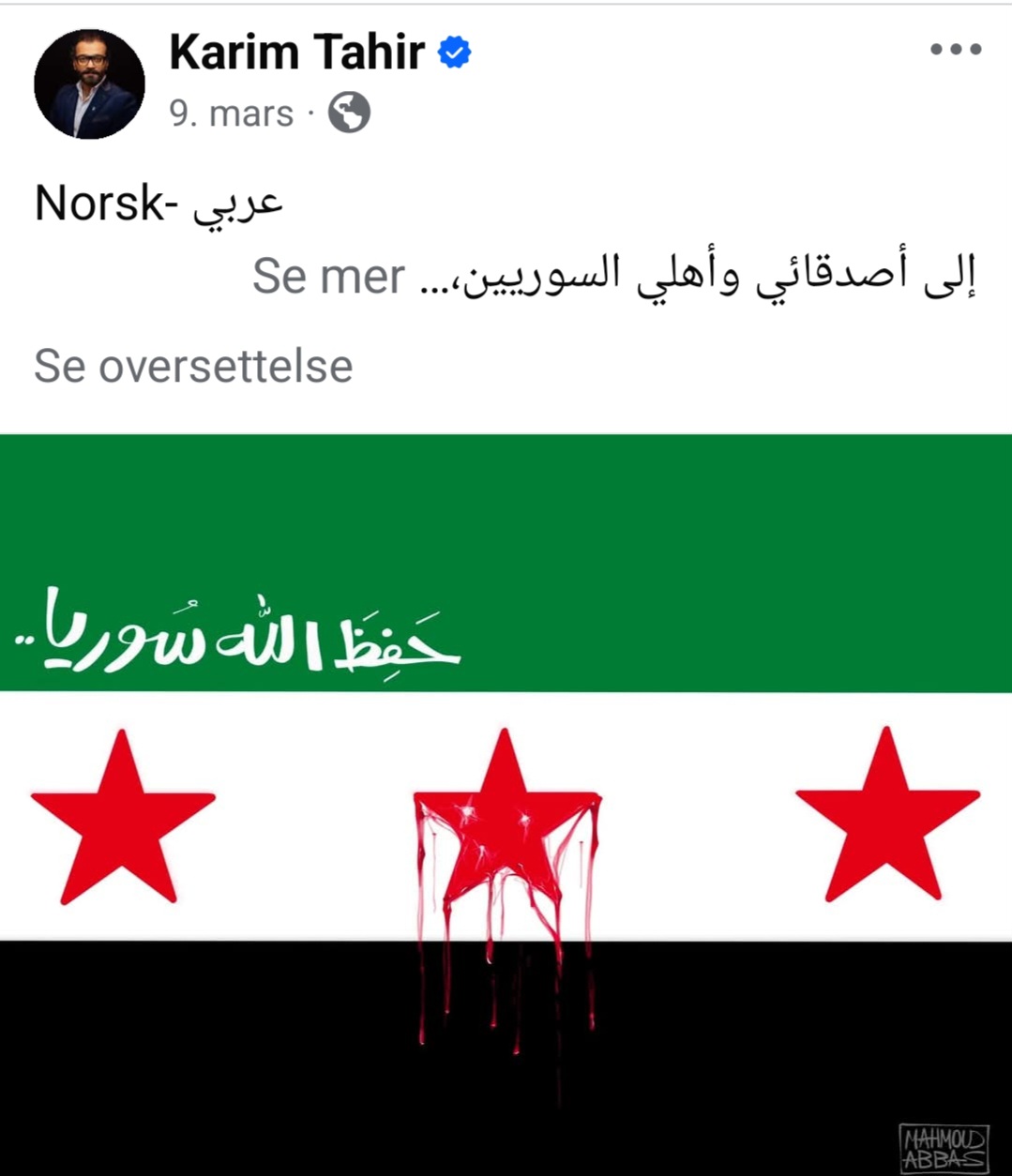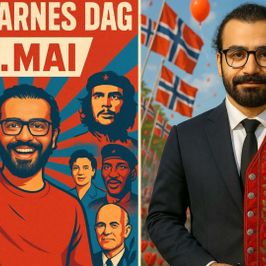Karim Tahir has been chosen to give this year’s 17 May speech at Johan Nygaardsvold’s statue in Trondheim. Tahir is the Syrian who unsuccessfully reported Document to the police and PFU earlier this year. On Facebook, he is keen for foreigners not to interfere in other countries’ affairs, and writes: – I consider the blood of all Syrians to be sacred. Let’s say with one voice: No to foreign interference in Syrian affairs. The future of the country lies in the hands of its own citizens.
Karim Tahir has described himself as an Iraqi, born in Kuwait, and that Syria is his beloved homeland, as Document reported some time ago, when he was employed as an advisor to Olavsfestdagene, Norway’s largest Christian festival. He wrote openly on Facebook last summer, in a travel letter, that Syria was his beloved homeland. At the time, he was in the country from which he had been granted asylum.
Tahir crossed the Mediterranean on a jet ski, via Turkey, and then travelled all the way up to Norway to apply for asylum. The actual asylum application was submitted as late as August 2016, according to a report in Sunnmørsposten, which followed the asylum interview. More than seven years later, he is a Norwegian citizen, elected to Trondheim City Council for the Labour Party, is a Muslim advisor for the Christian Olav’s Festival in Trondheim, and has been selected to speak on 17 May at the memorial to one of Norway’s great men. In other words, Johan Nygaardsvold’s legacy is somewhat divided, but he was a resistance fighter against the invasion of the time, and Prime Minister in the important years 1935-45.
– No to foreign interference
Those who have chosen this year’s 17 May speakers may not have read what Karim Tahir wrote on Facebook on 9 March this year. In short, he wrote that foreigners should stay away from the government of other countries:
I am Karim Tahir, Norwegian-Iraqi, born to an Iraqi Shiite Muslim father and a Syrian Sunni Muslim mother. I lived in Syria for 25 years, from the age of 11, studied at Syrian schools and universities, married a Syrian woman, and had my children there. Syria has always been, and still is, a home to me. I owe the country and its people for all the kindness and support they have given me, even after I moved to Norway, where the Syrian community has continued to be a firm support.
I would like to emphasise that I consider the blood of all Syrians to be sacred, without any kind of exception or discrimination. The Syrian blood, whether it belongs to Sunnis, Shiites, Alawites, Kurds, Druze or Christians, is irreplaceable and must never be underestimated. I deeply apologise if anyone has felt offended or misunderstood, or thought I was promoting an agenda to tarnish a new leadership or support foreign interests.
I in no way support foreign interference in Syrian affairs. I am painfully aware of the disastrous consequences of foreign interference in both Iraq and Libya. The former Syrian regime is now a thing of the past and there is no going back to the past. What we need to do now is to focus on building a shared future, governed by Syrians themselves, without outside interference, but with the support of the international community where necessary.
We need peace, stability and a strong and independent Syrian state. Assad and his regime, with all the suffering it brought with it, are over. Now we must look to the future.
Let us say together:
No to foreign interference in Syrian affairs.
No to threats to the security and unity of the Syrian people.
No to attacks on the institutions of the new Syrian state.
No to attacks on the Syrian security forces. They must be supported in their efforts to re-establish full control over all of Syria, to ensure peace and security for all Syrians.
Syria is strong with its institutions and its diverse people. The future of the country lies in the hands of its own citizens.
With all due respect and love, Karim Tahir
In other words, he believes that countries should be governed by their own people, without outside interference. He in no way supports foreign interference in his own country and says no to foreign interference in his country’s affairs.

Karim Tahir’s post about foreigners staying away from other people’s countries was written in both Arabic and Norwegian, and with a bleeding Syrian flag. Screenshot Facebook/Karim Tahir.
So it’s somewhat odd that he has not only remained in Norway now that the wars are over, as Syria is his beloved homeland, but is also doing everything he can to contribute to foreign interference in our country. Politically, he is a member of the city council and wants to enter the Norwegian Parliament. And culturally, he takes on just about everything possible in terms of cultural roles and assignments, including as a 17 May speaker in a country where he has no roots. It almost sounds like a double standard?
Wants to speak in national costume
On 13 April this year, Tahir asked for tips on how to wear a national costume.
I’m considering wearing a bunad – what do you think?
If so, which type is best suited to Trondheim?
And do you know where I can find a bunad of good quality, but at a reasonable price – either for purchase or hire?
Claimed the Syrian, who did not reveal that the purpose was that he was selected as a 17. May speaker, but only that he was «invited to participate in a special 17. May activity, and kept the rest a secret.
Olav painted the cross with his blood on Norway
Before Karim Tahir lays a wreath and gives a speech at Prime Minister Nygaardsvold’s statue at Cicignons plass in Trondheim, three verses will be sung from Norway’s national anthem, Ja, vi elsker dette landet (Yes, we love this country). “At decisive moments in the life of the nation, the song has acted as a symbol of freedom, unifying and strengthening,” writes Store norske leksikon. It mentions that the song was particularly important during the Union struggle, because Norwegians did not want to be with Danes or Swedes, and similarly mentions the occupation during the war, because Norwegians did not want to become German either. We don’t know which three verses will be sung at Karim Tahir’s 17 May speech. Or what relationship he, as a Syrian Muslim, has to verses like this:
Yes, we love this country
as it rises up,
furrowed, weather-beaten over the water,
with the thousand homes.
Love, love it and think
of our father and mother
and the fairytale night that lowers
dreams on our earth.
This is the land that Harald built
with his row of giants,
this is the land Håkon guarded
while Øyvind chanted.
On that land Olav painted
the cross with his blood,
from its height Sverre spoke
Rome in the centre.
During the ceremony at Karim Tahir’s 17th capital, Freedom’s Outpost will also be sung, and there are possibly stanzas that are particularly moving for a Syrian?
During World War II, Freedom’s Outpost was sung by Norwegians in German concentration camps. The lyrics are by Arne Paasche Aasen (1901-1978), the melody by Jolly Kramer-Johansen (1902-1968):
If you see the hills of the city and your hometown,
do you see the rolling hills and mountains?
This is the Norway of the people and the future.
It is yours. You will own it yourself!
Can you hear it thundering towards you
like a song in the dusky evening?
Comrades! Comrades!
It’s the outpost of freedom in the north.
We will build. We shall secure,
We will guard every foot of its soil!
I will guard my country
Some of the other 17 May speakers in Trondheim this year include:
Wreathing of the Eidsvoll men’s monument at Domkirkegården: Speech: Leon Bafondoko. He is a quota refugee from Congo, represents the Labour Party, and is concerned with issues such as racism. Two verses of Bjørnson’s Jeg vil værge mitt land will be sung.
Consecration of King Olav V’s statue in Stiftsgårdsparken: Speech by Daniel Agøy Hegge, 7th grade, and wreath laying by Soliyana Elias Aklilu, 10th grade, students at Tomasskolen.
Wreathing of the Memorial to the Victims of the Struggle for Freedom at the Cathedral Cemetery: Speech by Deputy Mayor Erling Moe from the Liberal Party, and God bless the land of Norway as a choir.
Wreath-laying ceremony for the memorial to fallen athletes at Elgeseter Bridge: Speech by Mayor Kent Ranum of the Conservative Party, and the hymn “Fedrelandssalmen – Gud signe vårt dyre fedreland”
As last year, the chair of the 17 May Committee in Trondheim is Radino Dizza Zulfi Mahendra, who represents the Conservatives. The others are Kirsti Tømmervold, deputy chair, Lise Andersen Wiseth, Elizabeth Berg Moan, Fredrik Steimler, Ingeborg Collin, Elise Eikrem Rindarøy, Nils Heldal, Iben Jonathan Moum, Oluf Johansen, Terje Olsen, Magne Bratteng, Tone Skjervold, Yogeswaran Sivapragasam, Joakim Uthus Guldseth and Helle Hox. According to the municipality’s English info about 17 May. The committee does not appear to be listed in the Norwegian version, or as it is called in Trondheim: 17. mai-utvalget.
It was a colourful 17 May in Trondheim also in 2024, and in Oslo this year’s chairman of the 17 May Committee is a communist from Iran, while the half-Egyptian Muslim Magdi Omar from Karpe gave last year’s 17 May speech at the Eidsvoll building. The question is whether there is anything in what Karim Tahir wrote earlier this spring?
Document has asked Karim Tahir for comment.

